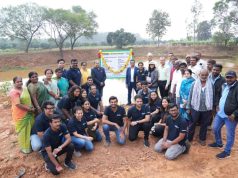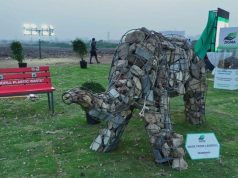Biodiversity, the lesser child of CSR
Usually when conversations happen on CSR in India, it is often seen that the topics being discussed are community development, with programmes like education, health-care, sanitation, livelihood…. and of course, the newer kid on the block, the CSR law. It is interesting how when you expand the acronym, CSR becomes Corporate Social Responsibility, and the weight shifts from Social to the actual key word — Responsibility.
A Responsible Corporate is one who does things because it is the right thing to do, not because the law demands that it be done. Responsibility is about doing good, and more importantly, behaving as a good citizen, not just to comply with current laws, but to transcend compliance. This must be driven by a governance system and a culture that pushes beyond, to attempt to address the needs of all key stakeholders, not just the needs of the shareholders and investors.
Community development is an extremely important focus area that we all need to train our sights upon as India steams ahead towards becoming a regional and global ‘superpower’ (somehow this word has a chauvinistic and one-dimensional tonality to it, but that’s a discussion for another day). However, the only way we can truly become a sustained superpower is if we also address a key stakeholder that somehow seems to be the lesser child in CSR decisions in the corporate world. This stakeholder is the natural environment, in particular, biodiversity.
While the environment has very low lobbying power in the corridors where decisions are made, it represents a key constituency — the future generation, who deserve a planet at least as rich, green and bio-diverse as what we have today. This is a seemingly silent stakeholder, as animals and plants do not have an influencing voice. But these
days, if we listen, we can hear their voices through the medium of extreme weather conditions, drying watersheds, unprecedented floods, crop failure, epidemics and many other impacts of changing climatic patterns.
Unfortunately, habitat degradation under the onslaught of ‘development’ is a big and silent killer of plant and animal species that go down without even a whimper. The sad part is that the parties involved are often unaware of the implications of their actions.
This is because biodiversity, as a science, is less understood by corporates as compared to environment management, (relating to emissions, effluents, etc) which one has to comply with. Even Community Development is fairly well understood (or better understood) by corporates, although social development is not general knowledge, and is packed with complex nuances that have far-reaching consequences if not tackled appropriately.
Biodiversity conservation, to my mind, is the least understood aspect and is often dealt with by corporates through tokenisms that do little for improving the plight of the environment, and in many cases, end up resulting in severe environmental degradation. A simple example of this is how everyone jumps onto the bandwagon of tree plantation at this time of the year – the pre-monsoons. Every ‘open’ space becomes the target of afforestation. Often, this ‘open’ space is a natural grassland that may not have the kind of tree cover that one may find in a forest. However, it is a bio-diverse ecosystem, with its own set of unique flora and fauna and thus, needs to be protected as much as a forest.
So while we do need to plant many more trees in the country, can we do it systematically and scientifically, with the choice of site, choice of species and responsibility of post-planting care all in place? There are countless examples of worse ‘crimes’ that are committed on the environment because the understanding and sensitivity towards biodiversity conservation are low.
Another critical element that needs to be debated is that the fundamental responsibility of the Corporate is to ensure that it addresses the impact of its projects, operations and supply chain through methodologies of avoiding, minimising, restoring/rehabilitating and offsetting. This must be done with a careful understanding of how the natural equilibrium is disturbed by the corporate’s presence. This is especially true for small, medium and large enterprises in the manufacturing, infrastructure and hospitality sector, that often don’t ‘sit lightly on the ground’ in terms of their impact on the environment. Some corporates involve themselves in high visibility programmes on the conservation of iconic species, but the addressal of their own impacts is sub-optimal.
There is nothing wrong in supporting the conservation of iconic species, and corporates must do it. The issue arises however, when on one hand, the corporate has not done enough in the space of avoidance, minimisation, restoration/ rehabilitation and offsetting its impact, and on the other, it is reaping the good publicity of its initiative of species conservation not related to its existence. This is seen as greenwash by society and tarnishes the name of the corporate sector in general.
Finally, there is interconnectedness between environment management (emissions, effluents etc), bio-diversity conservation (flora, fauna and habitats) and social development (livelihoods, health education etc) that is important for all of us to value and respect, when we think about Corporate Social Responsibility. It is the need of the hour for corporates to embrace biodiversity conservation within their agenda, especially if their impacts on the environment are high, and they must do this by involving conservation agencies and experts.
Schedule VII of the CSR law allows biodiversity conservation as CSR spend, but this lesser child of CSR gets a very little share of the pie, and in the process, the future generations are denied their opportunity and right to inherit a planet that is at least as good as ours.
This article was first published in the August 2018 print edition of The CSR Journal. Click here to get a copy.
 The author is former Chief Sustainability Officer and Chief Culture Officer, TATA Power. He was part of the think tank of the Tata Affirmative Action Program. He is also a Trustee in Antarang Foundation.
The author is former Chief Sustainability Officer and Chief Culture Officer, TATA Power. He was part of the think tank of the Tata Affirmative Action Program. He is also a Trustee in Antarang Foundation.
Views of the author are personal and do not necessarily represent the website’s views.
Thank you for reading the column until the very end. We appreciate the time you have given us. In addition, your thoughts and inputs will genuinely make a difference to us. Please do drop in a line and help us do better.
Regards,
The CSR Journal Team













